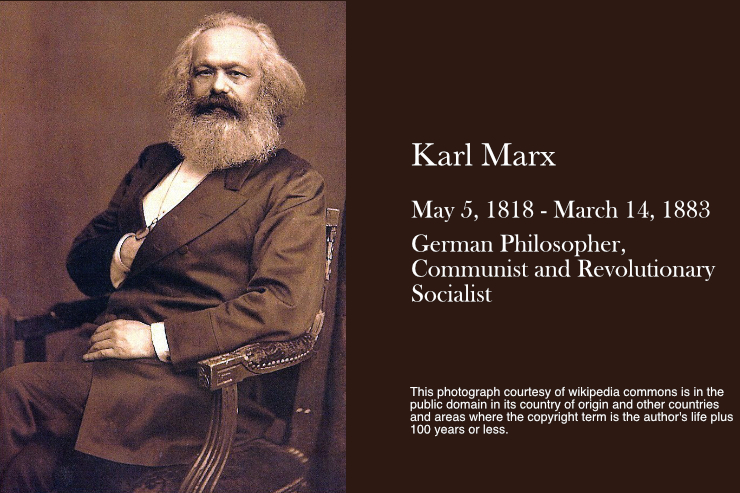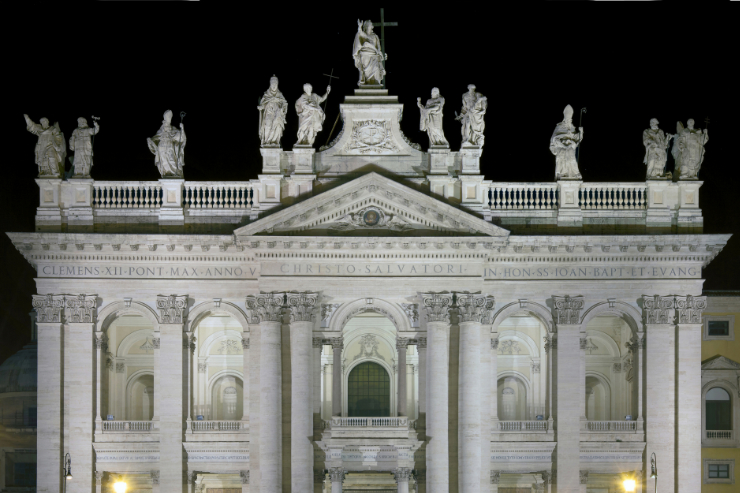If ever someone challenges the truthfulness of the concept that “ideas have consequences” it would be good to remind them of our next philosopher in this examination of the causes of our modern “God is Dead” morality.
Besides Karl Marx, no other writer has written anything that has caused so much bloodshed in the history of ideas. As a result of “The Manifesto of the Communist Party” the body count in Russia, China, the Far East, Cuba and countless other places in the world now totals over one hundred million. More importantly, the ideas that Marx espoused have spread throughout the world and even infiltrated the Catholic Church.
While Karl Marx wrote many other books and articles, notably his critique of capitalism entitled Das Kapital, for our purposes I will only focus on two key ideas that are a foundation to his philosophy: atheistic materialism and the class struggle.
Karl Marx
Karl Marx (1818 – 1883) wrote his first doctoral thesis on Prometheus, from Greek mythology, whom he greatly admired. Dr. Donald DeMarco, in his book Architects of the Culture of Death quotes Marx as writing: “I hate all the gods … I would much rather be bound to a rock, than to be the docile valet of Zeus the Father. … Prometheus is the first saint, the first martyr on the calendar of philosophy.” [i]
Clearly Marx was an atheist who believed that religion was a hindrance to the freedom and development of human beings. For human beings to be authentic it necessitated the nonexistence of God. It was Marx who coined the phrase that religion was “the opium of the people.” DeMarco writes:
“Marx hated the gods because the very idea that there might be a divinity outside of man necessarily meant oppression of the individual. He hated the concept of God because it prevented human beings from achieving their rightful human fulfillment, and so he went beyond his role model, Prometheus, by not just defying the gods, but denying their very existence. In this way, the gods could never again oppress man or torture his liberators.” [ii]
Communism, and its basic premises, predated Marx and he was not the only one who espoused its ideas but Marx did put his stamp on it by force of his personality. Carl Schurz, a contemporary of Marx, describes him this way:
“I have never seen a man whose bearing was so provoking and intolerable. To no opinion which differed from his own did he accord the honour of even condescending consideration. Everyone who contradicted his he treated with abject contempt; every argument that he did not like he answered either with biting scorn at the unfathomable ignorance that prompted it, or with opprobrious aspersions upon the motives of him who had advanced it … he denounced everyone who dared to oppose his opinion.” [iii]
This description would explain why there were only eleven mourners at Marx’s funeral. [iv] Much of the strength of Marx’s ideas stem from the force of his personality, the obvious injustices that were taking place during the Industrial Revolution and the allure of a worker’s paradise that would be achieved after the much promised success of the revolution.
Two Key Ideas
The first of his two key ideas is that of atheistic historical materialism. Like Hobbes, Marx believed that there was no creating God, no plan, design or providence that worked in the universe and as a result there was no metaphysics that could posit knowable, immaterial principles by which and through which the universe existed. For Marx there was only the unstoppable progress of history through the process of matter. Marx adapted this theory from the writing of Georg Hegel who tried to explain history as the progress of ideas through dialectical conflict. According to Hegel, first you have a particular idea, which he called the “thesis.” A counter idea then arises to challenge this thesis, which he called “antithesis.” The struggle between these two ideas produces a ‘synthesis’ which became the new ‘thesis’ and the process started all over again. [v]
Marx’s dialectical materialism removes the premise of the conflict of ideas as the impetus of history and replaces it with the conflict of economic classes. Since human beings are material beings they need to produce, by their labour, the necessities for existence such as food, clothing, shelter, etc. The more complex and advanced the society the more diverse and complex is the division of labour that produces them. Therefore, the root of all of this historical conflict, so far as it concerns human beings, is human labour and what it produces. In other words, human beings and human history are defined by economics. [vi]
One other difference between Marx and Hegel is that Hegel believed that the conflict of ideas is ongoing and will never cease until history ceases. For Marx, the conflict between the classes would cease as soon as class division was eliminated. Once a classless society was achieved the dialectical process would stop.
Now while this is a very simplified explanation of the philosophy known as the Marxist dialectic it suffices to explain how this idea leads into the second key idea held by Marx, namely, class struggle.
Marx’s declared that “The history of all hitherto existing society is the history of class struggle.” [vii] Notice that he did not say that “part of history” is the history of class struggle but rather that all of it is class struggle. That’s like taking the appetizer portion of a five course meal and calling it the entire meal! Certainly a component of history is the struggle between classes such as landlords and their vassals during feudalism but there was certainly much more involved.
Yet this is what Marx did and what resulted was a very simplistic but dangerous idea that went something like this: remove the classes and you eliminate class warfare; if you eliminate class warfare, then you will have the ideal society. Marx explains it this way:
“The communist revolution is the most radical rupture with traditional property relations; no wonder that its development involves the most radical rupture with traditional ideas … In place of the old bourgeois society, with its classes and class antagonisms, we shall have an association in which the free development of each is the condition for the free development of all.” [viii]
Unlike Rousseau, who, as we saw in the previous article, held that human beings started off simple and innocent only to become corrupt as society became more complex, Marx believes the reverse. Human society is corrupt because it is complex and composed of classes. Remove the classes and you will have a simple, equitable and idyllic society.
Ideas have consequences
The number of negative consequences that flow from Marx’s ideas are too numerous to mention and explain in this article. However, I would like to focus on the one consequence that Benjamin Wiker mentions is his book 10 Books That Screwed Up The World, a consequence that has been very much on the mind of the present Pope and was a topic for the last Synod, namely the family.
If every human interaction can be explained by way of “class struggle” then the institution of the family, with its relationship between men and women, is also one of class struggle. Therefore, if communism is to be implemented and its promised utopia to be achieved then marriage itself must be abolished. When challenged with this consequence Marx does not deny it but aggressively responds to the challenge:
“Abolition of the family! Even the most radical [bourgeois thinkers] flare up at this infamous proposal of the communists. … On what foundation is the present family, the bourgeois family, based? On capital, on private gain. In its completely developed form this family exists only among the bourgeoisie. But this state of things finds its complement in the practical absence of the family among the proletarians [because they work all their waking hours in factories, and hence are only together for a few hours of sleep], and in public prostitution.
“The bourgeois family will vanish as a matter of course when its complement [the proletarian family] vanishes, and both will vanish with the vanishing of capital…” [ix]
Marx goes on, accusing the bourgeois of already having destroyed marriage, since he claimed that most men had mistresses anyways, what he called “a community of women.” Nor does Marx explain how society will manage without marriage and family. Looking back with the aid of hindsight we can see that much of modern Western marriage has been affected by this communist idea, especially in the ideology of certain feminists. Aldous Huxley, in his book “Brave New World” perhaps gave us the best glimpse of what Marx’s ideas would result in.
The abolition of marriage, as seen in the acceptance of divorce and the redefinition of marriage, is certainly just one of the logical consequences of Marxism, but it is not the most obvious one. The real impact of Marx’s ideas can be seen in the realm of politics and revolutions, with the number of dead so staggering:
“We can see at this point why Marx’s engine of revolution left its tracks so littered with corpses. Marx envisioned a misty and impossible goal and set it just beyond the reach of his devotees who were desperate enough (severely oppressed labourers) or foolish enough (intellectuals in the worst sense, like himself) to believe the fantasy as fact. …
“If Marxism proves anything, other than that the road to savagery is too often paved with gullibility as well as good intentions, it is the Christian doctrine of sin. To put it another way, if you really want to test whether there is an original and indelible fault that warps the human soul and is impossible to erase without divine intervention, then put power into the hands of those who, rejecting the existence of God as well as sin, wish to bring heaven to earth.” [x]
This is one of the reasons why I cringe every time I hear a church choir start singing “Let us build the City of God!”
Footnotes
[i] DeMarco, Donald and Wiker, Benjamin; Architects of the Culture of Death; Ignatius Press, San Francisco, 2004; p. 122
[ii] Ibid
[iii] Quoted in … Francis Wheen, Karl Marx: a Life (New York: W.W. Norton & Company, 1999, p135
[iv] Wiker, Benjamin; 10 Books That Screwed Up The World; Regnery Publishing, Inc., Washington; 2008; p60
[v] Unfortunately many theologians who were influenced by Hegel and Marx soon incorporated this process of ‘dialectic’ and tried to apply it to the Deposit of Faith, resulting in the Modernist idea that Church teaching can “change” over time. Modernism was condemned by Pope Pius X. Later there arose the writings of theologians who promoted a ‘liberation theology’ which borrowed many of the ideas and assumptions of Marx. These were refuted by Pope St. John Paul II and Joseph Cardinal Ratzinger.
[vi] https://www2.bc.edu/~heineman/marx.html
[vii] Karl Marx and Friedrich Engels, Manifesto of the Communist Party in Basic Writings on Politics and Philosophy, edited by Lewis S. Feuer (Garden City, NY: Doubleday & Company, Inc., 1959), p6
[viii] Ibid 26-29
[ix] Ibid 25-26
[x] Wiker, p70















